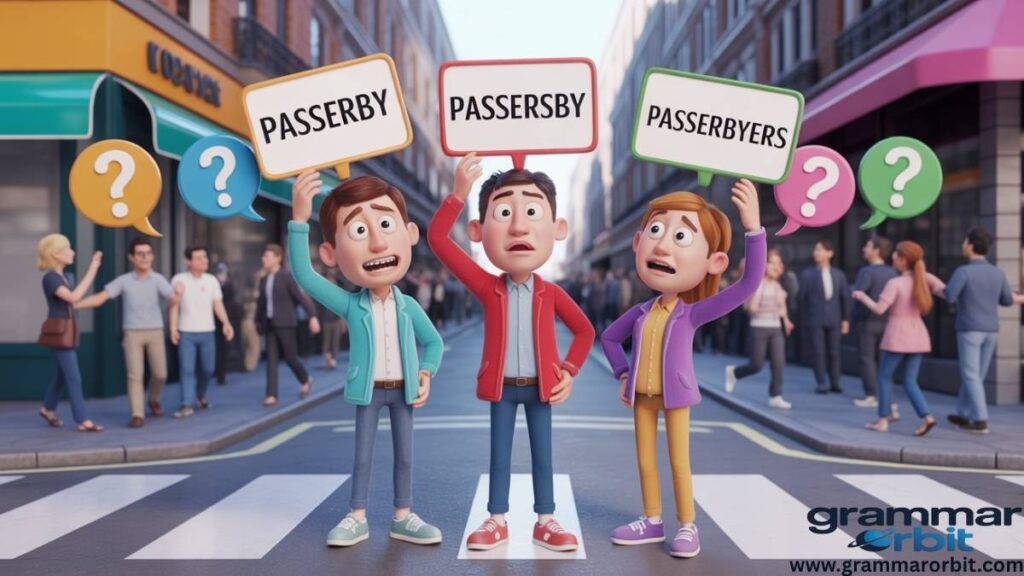Have you ever stopped mid sentence, staring at your screen, wondering if the correct word is passerby, passersby, or that Frankenstein creation passerbyers? Don’t worry, you’re not losing it. English just likes to mess with us sometimes. It’s the same language that gave us mice instead of mouses and geese instead of gooses, so really, what did we expect? The plural of passerby might sound like something invented by a tired grammar teacher after too much coffee, but there’s a method to the madness. Buckle up, because we’re about to stroll through the weird, wonderful world of passersby no map required.
What “Passerby” Actually Means
Passerby Definition & Meaning
A passerby is simply a person who passes by. You might use it to describe someone walking past an accident, a shop, or a crowd.
Examples:
- “A passerby called the police after hearing the alarm.”
- “One passerby stopped to help the injured cyclist.”
Where It Comes From
The word passerby is a compound noun, formed from passer (someone who passes) and by (meaning alongside). It first appeared in English several centuries ago as passer by with a hyphen and over time evolved into the single word passerby.
When We Use It
You’ll find passerby in all kinds of contexts newspapers, novels, academic writing, and daily conversation. It usually refers to an incidental observer, not someone directly involved.
Serpent vs Snake: What’s the Difference?
The Core Confusion
Passerby vs Passersby vs Passerbyers
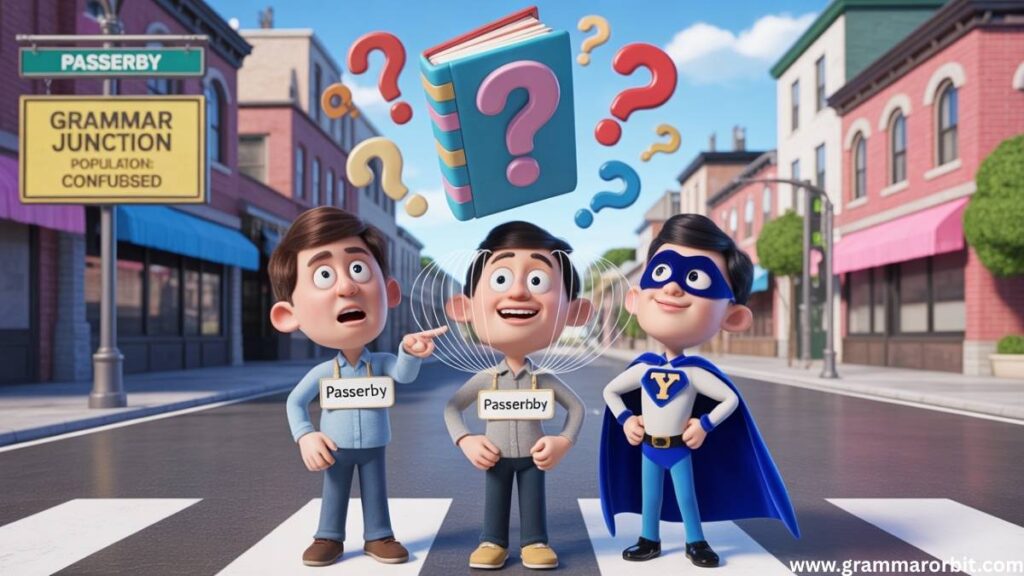
Let’s look at the three variations and why only one is right:
- Passerby → singular (one person)
- Passersby → plural (more than one person)
- Passerbyers → incorrect (sounds logical, but grammatically wrong)
- Passerbys → also incorrect
At first glance, “passerbyers” might seem fine after all, English words often get “-ers” for plural or occupational meanings. But passerby doesn’t follow standard pluralization rules.
Singular and Plural Forms Explained
Singular Form
Use passerby when referring to one person:
- “A passerby noticed the smoke.”
- “That passerby looked confused.”
Plural Form
Use passersby when referring to more than one person:
- “Several passersby rushed to help.”
- “The park was full of curious passersby.”
FG Meaning in Text: Understanding Its Different Uses and Contexts
Quick Reference Table Passerby Passersby or Passerbyers
| Form | Meaning | Correctness |
|---|---|---|
| passerby | One person passing by | ✅ Correct |
| passersby | More than one person passing by | ✅ Correct |
| passerbyers | Incorrect plural | ❌ Wrong |
| passerbys | Incorrect plural | ❌ Wrong |
Why “Passersby” Is Correct The Grammar Logic
The Rule Behind It
English has a quirky rule for compound nouns:
Pluralize the main noun, not the word that follows it.
In passerby, the main noun (or “head noun”) is passer — by is just a preposition modifying it. When pluralizing, the passer takes the “-s”:
passer + s + by = passersby
Other Examples That Follow the Same Rule
| Singular | Plural | Explanation |
|---|---|---|
| attorney general | attorneys general | The main noun “attorney” takes the plural |
| mother-in-law | mothers-in-law | “Mother” is the head noun |
| passerby | passersby | “Passer” is the head noun |
| looker-on | lookers-on | “Looker” is the head noun |
These are all examples of irregular plural nouns part of a small group that breaks the standard “add s at the end” rule.
Why “Passerbyers” Sounds Logical But Is Wrong
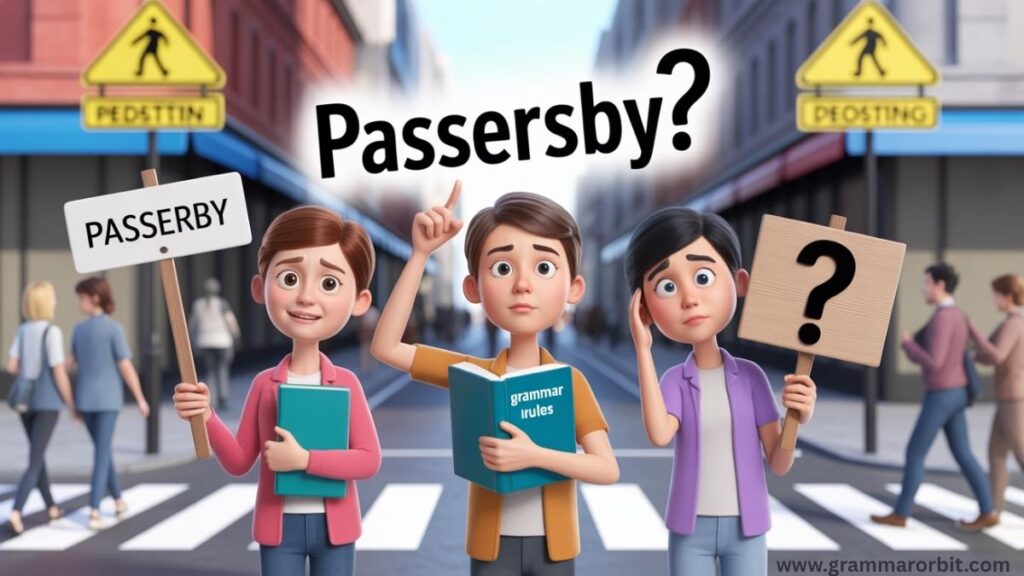
Why People Say It
Adding “-ers” feels natural. English speakers often add “-er” or “-ers” to show plural or profession (baker → bakers, runner → runners). So “passerbyers” might sound right, but it’s grammatically off because:
- The base noun passer is already pluralized in passersby.
- The extra “ers” duplicates the plural form.
Real-Life Examples of the Mistake
- ❌ “Many passerbyers stopped to take photos.”
- ❌ “The passerbys were watching the parade.”
- ✅ “Many passersby stopped to take photos.”
Why It Matters
Using the wrong form can make your writing look careless especially in professional or academic settings. For learners of English, these errors can stick and affect clarity.
The Grammar Rule Behind the Plural of “Passerby”
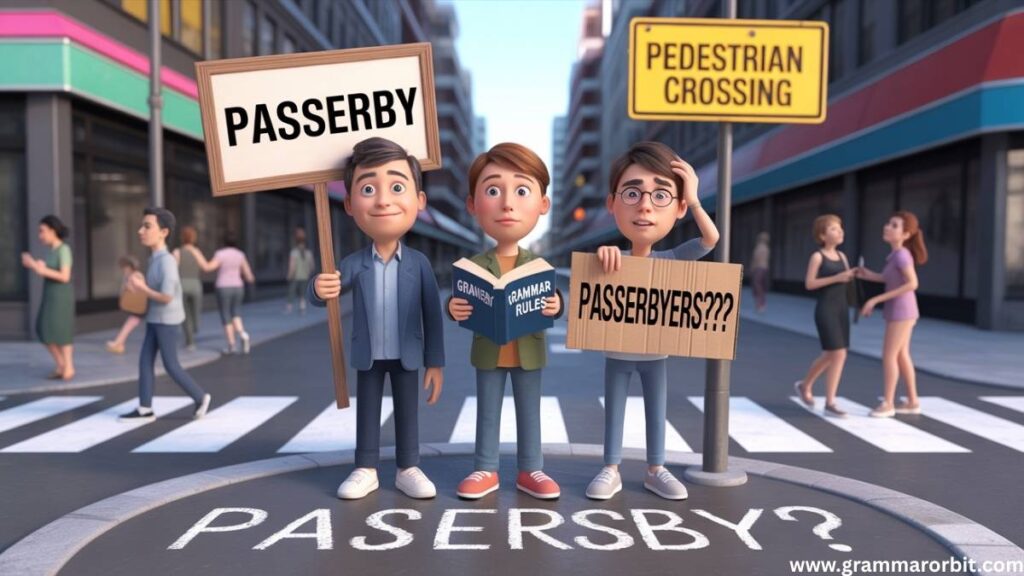
How Compound Nouns Work
Compound nouns are two (or more) words joined to form one meaning like mother in law, editor in chief, or passerby.
When pluralizing, always pluralize the main word (the part carrying meaning).
Examples:
- brother-in-law → brothers-in-law
- editor-in-chief → editors-in-chief
- passerby → passersby
Simple Steps to Pluralize Compound Nouns
- Identify the main noun (the “thing” being counted).
- Add “-s” to that main word, not to prepositions or modifiers.
- Keep the rest of the structure unchanged.
Hyphenation & Style Guide Insights: “Passer-By” vs “Passerby”
American vs British English
- British English: often uses the hyphenated form passer-by and its plural passers-by.
- American English: prefers the closed form passerby and passersby.
- 🇺🇸 American English typically prefers the closed form passerby and passersby no hyphen needed.
- 🇬🇧 British English often keeps the hyphenated form passer-by and passers-by, sticking closer to its older spelling tradition.
- Style guides differ: American publications like The Chicago Manual of Style recommend the closed form, while British outlets such as The Guardian style guide accept both.
- Pronunciation: There’s little to no difference in how it’s spoken, though British English may stress the “by” slightly more.
- In formal writing: British English still favors the hyphenated style for clarity, while American English tends to modernize by closing the compound.
IKTR Meaning in Text: Definition, Uses, and Contexts
Modern Usage
Today, both forms are accepted, but the closed form (passerby) is far more common, especially in digital and journalistic writing.
| English Type | Preferred Form | Plural |
|---|---|---|
| American English | passerby | passersby |
| British English | passer-by | passers-by |
Consistency matters most. Choose one form and stick with it throughout your writing.
Examples of “Passersby” in Real Sentences
From News and Everyday English
- “Several passersby helped lift the car off the trapped pedestrian.”
- “The gallery attracted curious passersby with its bright window display.”
- “Curious passersby stopped to watch the street performer juggle flaming torches.”
- “Several passersby offered to help when the car broke down in the middle of the road.”
- “A group of passersby gathered near the bakery, drawn in by the smell of fresh bread.”
- “Police thanked the passersby who provided crucial eyewitness accounts.”
- “Tourists and passersby couldn’t resist snapping photos of the giant snow sculpture.”
- “Most passersby ignored the man handing out flyers, pretending to check their phones.”
From Literature
- “A lonely passerby paused at the gate, unsure whether to knock.”
- “At dusk, the street was filled with passersby hurrying home.”
- “A lonely passerby paused beneath the streetlamp, watching the snow fall in silence.”
- “The city buzzed with noise, yet not one of the hurried passersby noticed the crying child.”
- “Each passerby seemed to carry a story, hidden behind hurried footsteps and tired eyes.”
- “Under the soft glow of lanterns, passersby laughed, argued, and vanished into the night.”
- “The poet sat by the window, sketching verses about the passersby who never looked up.”
Quick Observation
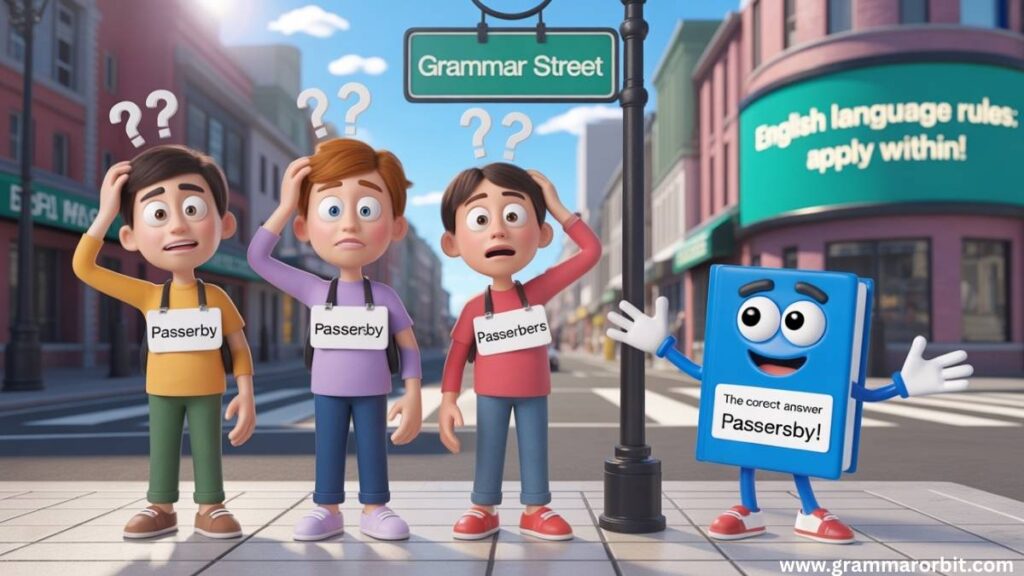
Notice how natural “passersby” sounds when used correctly. It flows smoothly and fits both formal and casual writing.
Common Mistakes and Why They Matter
Case Study: Grammar in Student Writing
A university professor once reviewed essays on “Everyday English Mistakes.” Out of 40 papers, nearly half included “passerbyers” or “passerbys.” Most students said they “just went with what sounded right.”
Lesson learned: sound doesn’t always equal correctness in English grammar.
Why Accuracy Matters
- It shows attention to grammar rules and writing clarity.
- It boosts credibility in business or academic contexts.
- It helps English language learners (ELL students) develop strong habits.
- It builds trust. Proper grammar signals professionalism and attention to detail, whether you’re writing an email or publishing an article.
- It keeps your message clear. One small error (like passerbyers) can confuse readers or make your writing sound awkward.
- It boosts your credibility. Employers, teachers, and readers notice when you use precise language and they take you more seriously for it.
- It helps you stand out. Clean, correct writing shines in a world flooded with quick texts and sloppy posts.
- It prevents funny misunderstandings. Let’s face it “many passerbyers saw the accident” sounds more like a herd of aliens than a crowd of people.
Before and After Example
- ❌ “Many passerbyers gathered around the artist.”
- ✅ “Many passersby gathered around the artist.”
A single letter changes everything.
How to Remember the Right Form
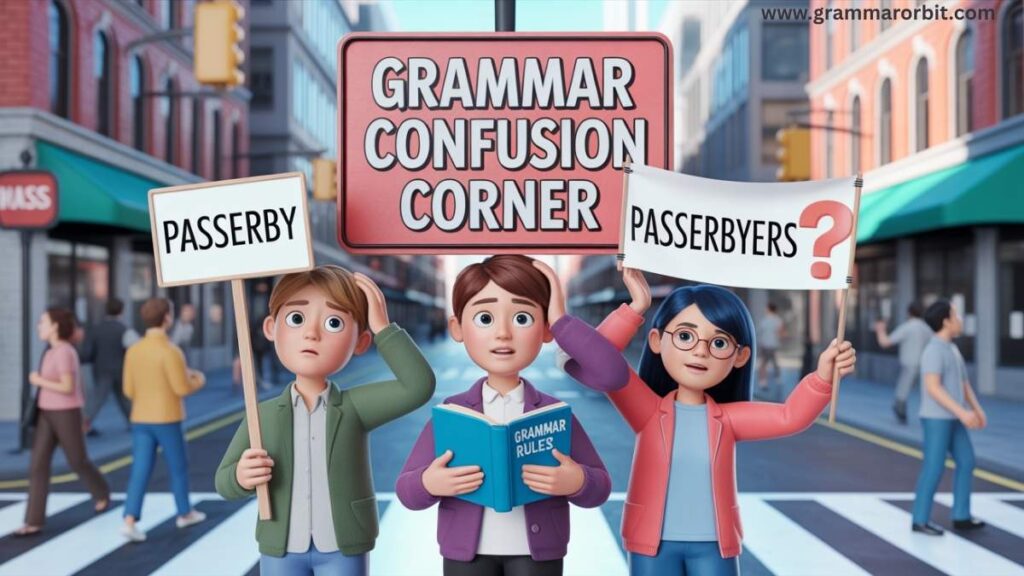
Mnemonic Trick
“Many passers go by.”
That’s your memory hook. The “s” belongs on passers, not by.
Visual Tip
Imagine several people walking past a shop. Each person is a passer. Together, they’re passersby plural passers walking by.
For Teachers and ESL Learners
Try this quick classroom exercise:
| Singular | Plural | Correct? |
|---|---|---|
| passerby | passersby | ✅ |
| mother-in-law | mothers-in-law | ✅ |
| attorney general | attorneys general | ✅ |
| passerbyers | – | ❌ |
This kind of pattern recognition helps students grasp compound noun pluralization intuitively.
Reference: Cambridge Dictionary Definitions
Here’s a trusted source for clear word meanings:
Other Compound Nouns That Break the Rules
Here are some irregular English plurals that behave like passersby:
| Singular | Plural | Explanation |
|---|---|---|
| attorney general | attorneys general | “Attorney” is the main noun |
| mother-in-law | mothers-in-law | “Mother” is pluralized |
| looker-on | lookers-on | “Looker” takes the plural |
| passerby | passersby | “Passer” is pluralized |
FAQs
Is it passersby or passerbyers?
The correct plural form is passersby, not passerbyers. The word passerbyers is grammatically incorrect and not used in standard English.
What is the meaning of passerbyers?
Passerbyers has no official meaning in English. It’s often a mistaken form of passersby, which refers to people who happen to be passing a particular place.
What is the plural form of a passerby?
The plural form of a passerby is passersby.
- Example: Three passersby helped the injured man.
What is a bypasser?
A bypasser refers to someone who goes past something or avoids it, often by taking another route.
- Example: The new highway allows bypassers to avoid city traffic.
While it’s a valid word, it’s less common than passerby.
Which is the correct plural?
✅ Correct: Passersby
❌ Incorrect: Passerbyers
How to use passerby in a sentence
- A passerby called the police after seeing smoke.
- Curious passersby stopped to watch the street performance.
Can we say person in plural?
Yes. The plural of person is people (most common) or persons (used in legal or formal contexts).
- Example: Five people attended the meeting.
- Example (formal): Several persons were named in the report.
What do you call a person passing by?
A person passing by is called a passerby.
Is it Chris’s or Chris?
Both can be correct depending on the style guide:
- Chris’s (preferred in most modern English usage, including Chicago and APA styles)
- Example: Chris’s car is new.
- Chris’ (used in some traditional or journalistic styles, like AP)
- Example: Chris’ house is on the corner.
Conclusion
So, the next time you’re standing on the sidewalk wondering whether it’s Passerby Passersby or Passerbyers, take a deep breath and remember only one of them won the grammar lottery. Hint: it’s passersby. English can be quirky, but calling people passerbyers is like calling geese gooses funny, but oh-so-wrong.
Whether you’re the Passerby Passersby or Passerbyers expert in your group or just someone trying not to trip over grammar rules, keep this in mind: a passerby is one person, passersby are many, and passerbyers should pass right out of your vocabulary. Grammar victory achieved!
JHON AJS is an experienced blogger and the creative voice behind the website grammarorbit.com, namely Grammar Orbit. With a keen eye for language and a passion for wordplay, he creates engaging grammar insights, word meanings, and clever content that make learning English enjoyable and interesting for readers.

